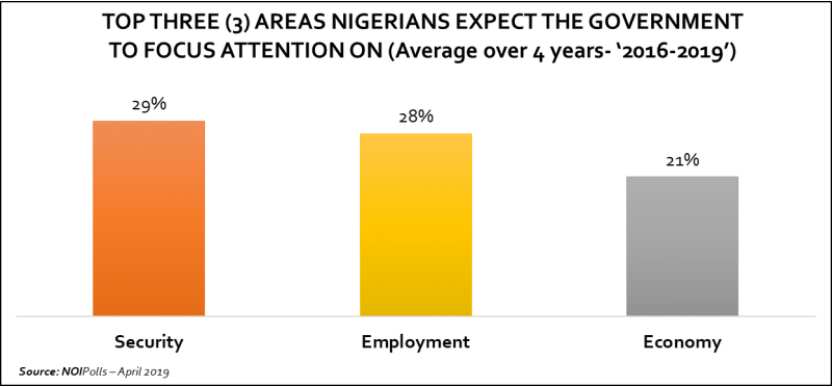- Unemployment is one of the three major issues Nigerians are battling at 28%
- The issue of unemployment is second to security which stands at 29%, where economy is 21%
- The rating of unemployment increased from 22.70% to 23.10% between second and third quarter of 2018
In celebration of the 2019 International Workers’ Day with the theme “Uniting Workers for Social and Economic Advancement”, NOIPolls have released a 4-year poll (2016-2019) on core issues facing Nigerians.
From the findings made from the polls, employments is one of the three biggest struggles Nigerians are facing where unemployment is 28%, security 29% and economy the third of the three 21%.
READ ALSO: We are taking over Anambra Government House in 2021 - APC
Though the employment comes second on the list, it is not untrue that it has been crippling the economy of the country.
According to the National Bureau of Statistics (NBS), unemployment rate in the country jumped from 22.70% in the second quarter of 2018 to 23.10% in the third quarter of 2018.
The government and other stakeholders in the country’s economy now have a huge responsibility to create an enabling environment for job creations, especially for Small and Medium Enterprises (SMEs).

NOIPolls show that economy ranks at 28% among issues facing Nigerians. Photo credit: NOIPolls
Source: UGC
When there is an enabling environment, SMEs contribution towards job creation will help in reducing unemployment.
Though the federal government recently signed the new N30,000 minimum wage into law, a lot still needs to be done to raise the standard of living.
For instance, a poll carried out by NOIPolls on workers’ welfare in 2011 showed that Nigerians are of the belief that N18,000 was inadequate.
NOIPolls came to the conclusion that for unemployment to be tackled, different policies like the National Employment Policy (NEP) of 2002, the national action Plan on Employment Creation (NAPEC), National Youth Policy (NYP) of 2009 as well as the National Policy on Education (NPE) need to be executed.
Meanwhile, Legit.ng earlier reported that the federal and state governments were advised by the Emir of Kano, Muhammad Sanusi II, to improve the agriculture sector to address unemployment in the country.
PAY ATTENTION: Download our mobile app to enjoy the latest news update
The monarch stated this in Bauchi at a pre-Ramadan lecture organized by the Bauchi chapter of the Association of Muslim Professionals on Sunday, April 14, Daily Trust reports.
It was also gathered that Sanusi, who was represented by the Sarkin Shanun Kano, Hassan Mohammed, noted that before the discovery of oil, Nigeria’s economy had been driven by agriculture.
NAIJ.com (naija.ng) -> Legit.ng. We have upgraded to serve you better
I need a job to feed my family - father of four | Legit TV
Source: Legit.ng
from Legit.ng: Latest Nigeria News Today & Breaking Naija News 24/7 http://bit.ly/2DGU8GM
via EDUPEDIA24/7
Comments
Post a Comment